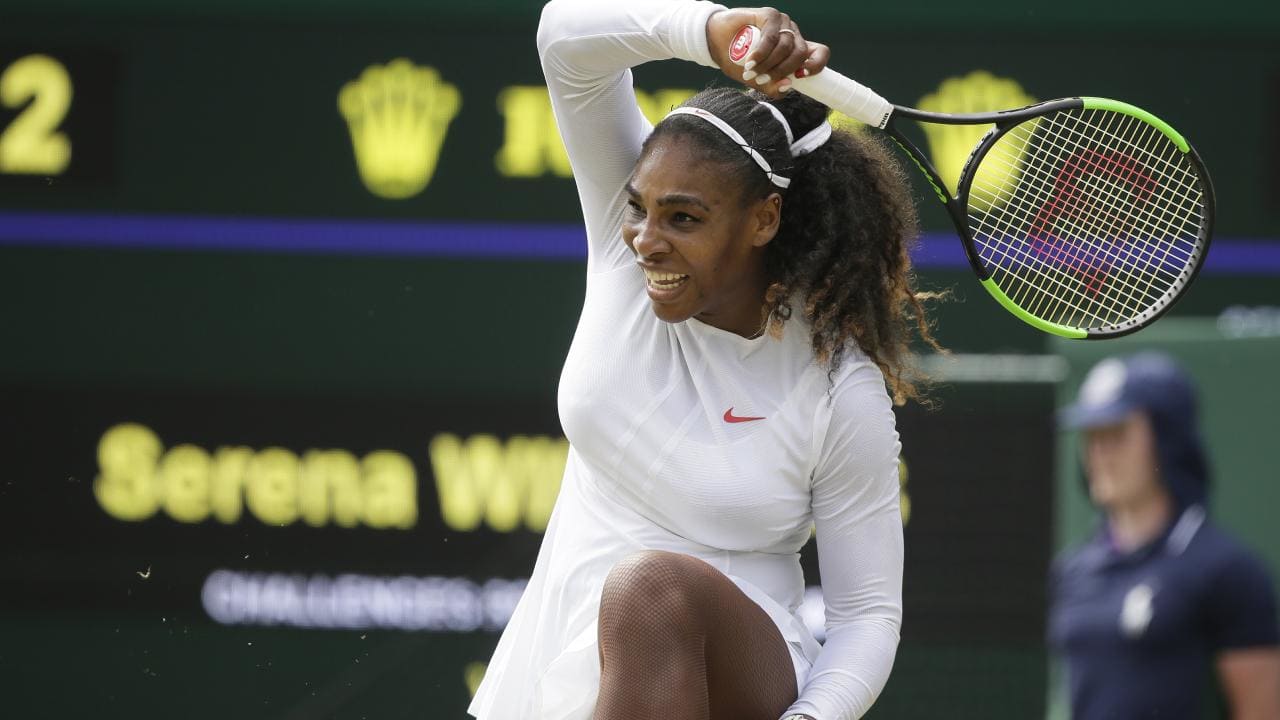
By Nancy Armour |
Of all the triumphs in her glorious career, nothing compares to what Serena Williams is doing at Wimbledon.
Ten months ago, she was fighting for her life, her lungs filling with clots following the birth of her first child, daughter Olympia. She endured four surgeries, and the recovery was so grueling that just walking to the mailbox was a struggle. The timeline she’d imagined for her return to the court had to be thrown out the window, two months’ worth of tournaments pared to just two before the French Open.
And yet, here she is, into Saturday’s Wimbledon final. A victory against Angelique Kerber would give Williams her 24th Grand Slam title, matching Margaret Court for the all-time record.
“This is not inevitable for me,” Williams told the BBC after beating Julia Goerges is straight sets Thursday.
“It’s definitely not normal for me to be at a Wimbledon final,” she added. “I’m taking everything as it is, and just enjoying every moment.”
Though the moment is most definitely hers, it’s for all of us, too. For her entire career Williams has been taking a racket to conventions that marginalize and minimize, and the last 10 days have been no different.
Every match she wins is reinforcement for all the mothers out there who juggle family and career while trying to push aside the nagging doubts that it’s never going to be enough. Every blistering stroke she hits is encouragement for anyone who’s ever felt as if their body has betrayed them. Every pump of her fist and shout of “Come on!” is inspiration for anybody who, regardless of the circumstances, has faced adversity and wondered if they could find the strength and determination to overcome it.
“This,” Williams’ husband, Alexis Ohanian, said on Twitter after Williams’ quarterfinal win, “is already nothing short of remarkable.”
In Williams, we are witnessing the greatest athlete of all time. Not greatest tennis player, not greatest female athlete. Greatest athlete, period. She played all of three matches in the previous 16 months, yet has dropped just one set here. After pulling out of last month’s French Open with a pectoral injury, she barely served until she got to Wimbledon.
When she was serving for the match only to be broken by Goerges, Williams responded with ferocity and fury. You could practically see her crank an internal dial up a notch as she won four straight points to break Goerges at love and win the match.
“She steps up her game,” Goerges said. “… She, yeah, showed me how to win those matches at that stage.”
But by putting her own greatness on display, Williams is also giving everyone who watches a reminder of the greatness that’s within all of us.
She might hobnob with royalty — Kensington Palace announced that her good friend, the Duchess of Sussex, will be at Saturday’s final — and is the rare celebrity who’s on a first-name basis with the entire world. But she’s also become the most approachable of idols, talking openly about her thoughts and fears in this comeback.
She referenced her “mommy brain” Thursday, and spoke of mental scars from her pulmonary embolisms that no blood thinner will ever completely dissolve. She reveled in her daughter’s latest development — “she’s walking, maybe a little too fast. She’s trying to go faster than her body will allow her to go” — and shared a reality check that can be a lesson for everyone.
“I’ve said it all week, this is only my fourth tournament back,” Williams said. “Every time I go out there, I want to, I guess, take a giant step forward. Keep giant steps, but keep improving.”
Regardless of the outcome Saturday, this Wimbledon is a resounding triumph. Not simply for how far Williams has come, but for the many millions who are walking taller and standing straighter because of seeing her along the way.
This article was republished with permission from the original author and 2015 Ronald Reagan Media Award recipient, Nancy Armour, and the original publisher, USA Today. Follow columnist Nancy Armour on Twitter @nrarmour.